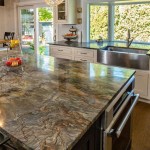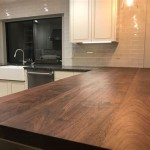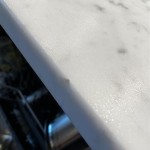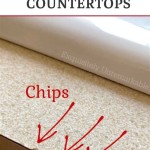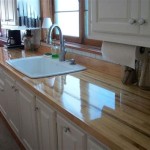Kinds Of Countertops For Kitchens
Kitchen countertops serve as a crucial functional and aesthetic element in any home. Selecting the appropriate countertop material involves considering various factors, including durability, maintenance needs, aesthetics, and budget. The market offers a diverse range of materials, each with its unique set of advantages and disadvantages. Understanding these characteristics is essential for making an informed decision that aligns with both practical requirements and personal preferences.
Granite Countertops
Granite is a natural stone widely favored for its durability, aesthetic appeal, and heat resistance. Formed deep within the earth under immense pressure, granite's density makes it resistant to scratches, stains, and heat damage. Its unique veining and coloration result from the mineral composition of the rock during its formation, meaning that each slab is distinct. This natural variation contributes to the character and visual interest of granite countertops, making them a sought-after choice for homeowners looking to add a touch of natural elegance to their kitchens.
The installation of granite countertops typically requires professional expertise due to the material's weight and the precision needed for cutting and fitting. Once installed, granite requires regular sealing to prevent stains from penetrating the porous surface. The frequency of sealing can vary depending on the type of granite and the sealant used. With proper care, granite countertops can maintain their beauty and functionality for many years, providing a long-lasting and visually appealing surface for food preparation and other kitchen activities.
From a cost perspective, granite generally falls into the mid-to-high price range, depending on the rarity and complexity of the stone's pattern and color. While the initial investment may be higher than some other options, the longevity and timeless appeal of granite can make it a worthwhile investment in the long run.
Quartz Countertops
Quartz countertops, also known as engineered stone, are composed of approximately 90-95% ground quartz combined with resins, polymers, and pigments. This manufacturing process results in a highly durable and non-porous surface. Unlike natural stone, quartz countertops are engineered to offer consistent color and pattern options. This consistency allows for greater control over the overall aesthetic of the kitchen, which can be particularly appealing to homeowners seeking a uniform look.
The non-porous nature of quartz makes it highly resistant to staining and bacterial growth. This characteristic simplifies maintenance, as quartz countertops do not require sealing. Routine cleaning with mild soap and water is generally sufficient to keep the surface looking pristine. This low-maintenance aspect is a significant advantage for busy households where time and effort spent on cleaning are limited.
Quartz countertops are available in a wide variety of colors, patterns, and textures, including options that mimic the look of natural stone. This versatility allows homeowners to achieve the desired aesthetic without the maintenance requirements of natural stone. The engineering process also allows for greater design flexibility, enabling manufacturers to create countertops with unique edge profiles and integrated features.
In terms of cost, quartz countertops typically fall within a similar price range as granite, with variations depending on the brand, color, and thickness. The combination of durability, low maintenance, and design flexibility makes quartz a popular choice for modern kitchens.
Solid Surface Countertops
Solid surface countertops are manufactured from acrylic or polyester resins combined with mineral fillers. This composition creates a non-porous material that is resistant to stains, scratches, and heat. One of the key advantages of solid surface countertops is their seamless appearance. Seams can be virtually invisible when properly installed, resulting in a smooth and continuous surface that is easy to clean and maintain.
Solid surface countertops are available in a wide range of colors and patterns, including options that mimic the look of natural stone and other materials. This versatility allows for a high degree of customization and design flexibility. The material can also be molded into various shapes and sizes, making it suitable for custom countertop designs and integrated sinks.
While solid surface countertops are durable, they are generally more susceptible to scratches and heat damage than granite or quartz. However, minor scratches can often be repaired by sanding or buffing the surface. Heat resistance is lower than that of natural stone or quartz; therefore, the use of trivets or hot pads is recommended to protect the surface from scorching.
From a cost perspective, solid surface countertops are generally more affordable than granite or quartz, making them a good option for homeowners on a budget. The combination of seamless appearance, design flexibility, and relatively low cost makes solid surface countertops a popular choice for both residential and commercial kitchens.
Laminate Countertops
Laminate countertops consist of a thin layer of decorative laminate bonded to a substrate, typically particleboard or plywood. Laminate countertops are available in a wide range of colors, patterns, and textures, including options that mimic the look of natural stone, wood, and other materials. This variety makes laminate a versatile and affordable option for kitchens of all styles.
One of the primary advantages of laminate countertops is their low cost. Laminate is one of the most budget-friendly countertop materials available, making it a popular choice for homeowners looking to renovate their kitchens on a tight budget. Laminate countertops are also relatively easy to install, which can further reduce costs.
However, laminate countertops are less durable than other countertop materials. They are susceptible to scratches, stains, and heat damage. The edges of laminate countertops are particularly vulnerable to chipping and peeling. When moisture penetrates the substrate, it can cause swelling and warping.
While laminate countertops require minimal maintenance, it is important to avoid using abrasive cleaners or harsh chemicals, which can damage the surface. Regular cleaning with mild soap and water is generally sufficient to keep the surface looking clean.
Despite their limitations, laminate countertops remain a popular choice for kitchens where cost is a primary consideration. The wide range of colors and patterns available allows homeowners to achieve the desired aesthetic without exceeding their budget.
Butcher Block Countertops
Butcher block countertops are made from strips of hardwood glued together to create a solid surface. Common wood species used for butcher block countertops include maple, walnut, cherry, and oak. Butcher block countertops are known for their warmth, natural beauty, and durability.
The natural warmth and character of wood can add a unique touch to any kitchen. Butcher block countertops are also relatively easy to repair. Minor scratches and dents can often be sanded out, and the surface can be refinished to restore its original appearance. Regular oiling is essential to maintain the moisture content of the wood and prevent it from drying out and cracking.
Butcher block countertops can be used as a cutting surface, but it is important to use a separate cutting board to avoid cross-contamination. The porous nature of wood makes it susceptible to bacterial growth, so it is important to clean and sanitize the surface regularly. Mineral oil or beeswax are commonly used to seal the surface and protect it from moisture.
From a cost perspective, butcher block countertops generally fall into the mid-range. The cost can vary depending on the wood species, thickness, and construction method. While butcher block countertops require more maintenance than some other options, their natural beauty and durability make them a popular choice for homeowners seeking a warm and inviting kitchen.
Stainless Steel Countertops
Stainless steel countertops are a popular choice for commercial kitchens due to their durability, hygiene, and heat resistance. However, they are also gaining popularity in residential kitchens for their sleek, modern aesthetic. Stainless steel countertops are non-porous, making them resistant to stains, bacteria, and heat. This characteristic makes them an ideal surface for food preparation.
Stainless steel countertops are easy to clean and maintain. Routine cleaning with soap and water is generally sufficient to keep the surface looking pristine. However, stainless steel is susceptible to scratches and fingerprints, so it is important to use non-abrasive cleaners and soft cloths to avoid damaging the surface. Some stainless steel finishes are designed to minimize the appearance of fingerprints.
Stainless steel is a relatively soft metal, so it can dent easily. However, minor dents and scratches can often be buffed out. Stainless steel countertops can be custom-fabricated to fit any kitchen layout. They can also be integrated with sinks and backsplashes for a seamless look.
From a cost perspective, stainless steel countertops typically fall into the mid-to-high price range. The cost can vary depending on the gauge of the steel, the finish, and the complexity of the design. While stainless steel countertops may not be suitable for all kitchen styles, their durability, hygiene, and modern aesthetic make them a popular choice for homeowners seeking a professional-grade kitchen.
Concrete Countertops
Concrete countertops are custom-made from a mixture of cement, aggregates, and additives. The mixture is poured into molds and allowed to cure, resulting in a durable and unique surface. Concrete countertops can be customized with a wide range of colors, textures, and finishes. They can also be cast with integral sinks, drainboards, and other features.
Concrete countertops are known for their industrial-chic aesthetic. They can be polished to a high gloss or left with a more rustic, textured finish. Concrete is a porous material, so it must be sealed to prevent staining and moisture absorption. The sealant should be reapplied periodically to maintain its effectiveness.
Concrete countertops are heavy, requiring reinforced cabinetry for support. The weight also makes them difficult to install. Concrete countertops are prone to cracking, although minor cracks can often be filled with a patching compound. Concrete countertops can be an environmentally friendly option if they are made with recycled aggregates.
From a cost perspective, concrete countertops typically fall into the mid-to-high price range. The cost can vary depending on the complexity of the design, the finish, and the sealant used. While concrete countertops require more maintenance than some other options, their unique aesthetic and durability make them a popular choice for homeowners seeking a custom kitchen.
Tile Countertops
Tile countertops consist of individual tiles installed over a substrate, typically plywood or cement board. Tile countertops are available in a wide range of materials, including ceramic, porcelain, glass, and stone. This variety allows for a high degree of customization and design flexibility. Tile countertops can be used to create intricate patterns and designs, adding visual interest to the kitchen.
Tile countertops are relatively durable and resistant to heat. However, the grout lines between the tiles can be difficult to keep clean. Grout is porous and can absorb stains and bacteria. Regular cleaning and sealing of the grout are essential to maintain the hygiene of the surface.
Tile countertops can be chipped or cracked, especially along the edges. Replacing damaged tiles can be difficult, as it may be hard to match the original tiles. From a cost perspective, tile countertops can range from affordable to expensive, depending on the type of tile used. Ceramic and porcelain tiles are generally the most affordable options, while glass and stone tiles are more expensive.
The installation of tile countertops requires skill and precision to ensure a level and even surface. The grout lines must be properly sealed to prevent water damage. While tile countertops may not be as popular as some other options, their versatility and design flexibility make them a viable choice for homeowners seeking a unique and customized kitchen.
Recycled Glass Countertops
Recycled glass countertops are made from post-consumer or post-industrial glass combined with cement or resin. The glass is broken down into small pieces and mixed with the binder to create a durable and visually appealing surface. Recycled glass countertops are an environmentally friendly option, as they divert waste from landfills and reduce the need for new materials.
Recycled glass countertops are available in a wide range of colors and patterns. The glass pieces can be arranged to create unique and artistic designs. Recycled glass countertops are relatively durable and resistant to stains. However, they can be susceptible to scratches and chips.
Recycled glass countertops are non-porous, making them easy to clean and maintain. Routine cleaning with soap and water is generally sufficient to keep the surface looking pristine. The cost of recycled glass countertops can vary depending on the type of glass used, the complexity of the design, and the binder. Recycled glass countertops typically fall into the mid-to-high price range.
The installation of recycled glass countertops requires professional expertise to ensure a smooth and even surface. The edges of the countertops can be sharp, so it is important to use a sealant to protect against cuts. While recycled glass countertops may not be suitable for all kitchen styles, their environmental benefits and unique aesthetic make them a popular choice for eco-conscious homeowners.

5 Popular Types Of Countertop Materials Hardman S

Diffe Types Of Kitchen Countertops Rochon
11 Types Of Countertop Materials Find The Best Kitchen
:max_bytes(150000):strip_icc()/top-kitchen-countertops-1977143-03-023194027a3749d28b2d06c727d6cfee.jpeg?strip=all)
15 Best Countertop Materials For Kitchens

Choosing A Countertop For Your Kitchen Look At The Differences Factory Direct Renovations Group
8 Types Of Countertops How To Choose The Best Countertop For Your Kit Vevano
:max_bytes(150000):strip_icc()/Screenshot2024-05-21at1.25.36PM-0a96e640ff414179ad9afa6ccd57e367.png?strip=all)
12 Types Of Countertops For A Kitchen Remodel

How To Choose The Best Kitchen Countertop Fitzgerald Kitchens

From Quartz To Wood A Look At The Best Kitchen Countertop Materials Boss Design Center
8 Types Of Countertops How To Choose The Best Countertop For Your Kit Vevano
See Also

